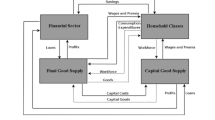Abstract
We analyze the impact of micro-founded political institutions on economic growth in an overlapping-generations economy, where individuals differ in preferences over a public good (as well as in age). Labour- and capital taxes finance the public good and a public input. The benchmark institution is a parliament, where all decisions are taken. Party entry, parliamentary composition, coalition formation, and bargaining are endogenous. We compare this constitution to delegation of decisionmaking, where a spending minister (elected in parliament or appointed by the largest party). Delegation of decisionmaking tends to yield lower growth, mainly due to the occurrence of production inefficiency.
Similar content being viewed by others
References
Acemoglu D, Johnson S, Robinson JA (2001) The colonial origins of comparative development: an empirical investigation. Am Econ Rev 91:1369–1401
Acemoglu D, Johnson S, Robinson JA (2005) Institutions as the fundamental cause of long-run growth. In: Aghion P, Durlauf S (eds) Handbook of economic growth. North Holland, Amsterdam
Austen-Smith D, Banks J (1988) Elections, coalitions, and legislative outcomes. Am Polit Sci Rev 82:405–422
Banks J, Duggan J (2001) A multidimensional model of repeated elections. Wallis Institute of Political Economy Working Paper no. 24, University of Rochester
Baron DP, Diermeier D (2001) Elections, governments, and parliaments in proportional representational systems. Q J Econ 116:933–967
Baron DP, Ferejohn J (1989) Bargaining in Legislatures. Am Polit Sci Rev 83:1181–1206
Baron DP, Diermeier D, Fong P (2006) Policy dynamics in a parliamentary democracy with proportional representation. Mimeo, Stanford University
Battaglini M, Coate S (2006a) Inefficiency in Legislative policy-making: a dynamic analysis. Am Econ Rev (forthcoming)
Battaglini M, Coate S (2006b) A dynamic theory of public spending, Taxation and Debt. Mimeo, Cornell University
Besley T, Coate S (1997) An economic model of representative democracy. Q J Econ 112:85–106
Diamond PA, Mirrlees JA (1971) Optimal taxation and public production I: production efficiency. Am Econ Rev 61:1–29
Dixit A, Romer T (2006) Political explanations of inefficient economic policies—an overview of some theoretical and empirical literature. Mimeo, Princeton University
Glaeser EL, La Porta R, Lopez de Silanes F, Shleifer A (2004) Do institutions cause growth? J Econ Growth 9:271–303
Hall R, Jones C (1999) Why do some country produce so much more output per worker than others? Q J Econ 114:83–116
Hettich W, Winer SL (1995) Decision externalities, economic efficiency and institutional response. Can Public Policy 21:344–361
evy G (2004) A model of political parties. J Econ Theory 115:250–277
Levy G (2005) The politics of public provision of education. Q J Econ 120:1507–1534
Lizzeri A, Perisco N (2001) The provision of public goods under alternative electoral incentives. Am Econ Rev 91:225–245
Marsiliani L, Renström TI (2004) Political institutions, environmental policy, and growth. CEPR Discussion Paper 4670
Milesi-Feretti GM, Perotti R, Rostagno M (2002) Electoral systems and the composition of government spending. Q J Econ 117:609–657
Osborne MJ, Slivinski A (1996) A model of political competition with citizen—candidates. Q J Econ 111:65–96
Persson T (2005) Forms of democracy, policy and economic development. Mimeo, Stockholm University
Persson T, Tabellini G (1994) Is inequality harmful for growth? Theory and evidence. Am Econ Rev 84:600–621
Persson T, Tabellini G (1999) The size and scope of government: comparative politics with rational politicians. Eur Econ Rev 43:699–735
Persson T, Tabellini G (2003) The economic effects of constitutions. MIT Press, Cambridge
Persson T, Tabellini G (2004) Constitutional rules and fiscal policy outcome. Am Econ Rev 94:25–46
Persson T, Roland G, Tabellini G (2000) Comparative politics and public finance. J Polit Econ 108:1121–1161
Persson T, Roland G, Tabellini G (2004) How do electoral rules shape party structures, government coalitions and economic policies? CEPR Discussion Paper 4226
Renström TI (1996) Endogenous taxation: an overlapping generations approach. Econ J 106:471– 482
Renström TI (2002) Political institutions and redistribution. In: Levine DK, Zame W, Ausubel L, Chiappori PA, Ellickson B, Rubinstein A, Samuelson L (eds) Proceedings of the 2002 North American Summer Meetings of the Econometric Society: Economic Theory. http://www.dklevine.com/ proceedings/development.htm
Rodrik D, Subramnian A, Francesco T (2004) Institutions rules: the primacy of institutions over geography and integration in economic development. J Econ Growth 9:131–166
Turnovsky SJ, Fisher WH (1995) The composition of government expenditure and its consequences for macroeconomic performance. J Econ Dyn Control 19:747–786
Wang H (2005) Forms of democracy and economic growth. MSc Dissertation, Department of Economics and Finance, University of Durham
Winer SL (1983) Some evidence on the effect of the separation of spending and taxing decisions. J Polit Econ 91:126–140
Author information
Authors and Affiliations
Corresponding author
Additional information
We wish to thank an anonymous referee, Toke Aidt, Roger Congleton, Avinash Dixit, Mike Felgenhauer, Pohan Fong, Piergiuseppe Fortunato, Arye Hillman, Stan Winer, and seminar participants at Southampton; Warwick; IIES, Stockholm; and participants at the Conference on Economic Growth and Distribution, Lucca, 2004; the Annual Meeting of the European Public Choice Society, Durham, 2005; the Midwest Macroeconomics Meetings, Iowa, 2005; the IIPF Congress, Jeju, 2005; the Money, Macro and Finance Research Group Conference, Rethymno, 2005; the WZB Conference, Berlin, 2005; and the North American Summermeeting of the Econometric Society, Minneapolis, 2006.
Rights and permissions
About this article
Cite this article
Marsiliani, L., Renström, T.I. Political institutions and economic growth. Economics of Governance 8, 233–261 (2007). https://doi.org/10.1007/s10101-007-0038-z
Received:
Accepted:
Published:
Issue Date:
DOI: https://doi.org/10.1007/s10101-007-0038-z




